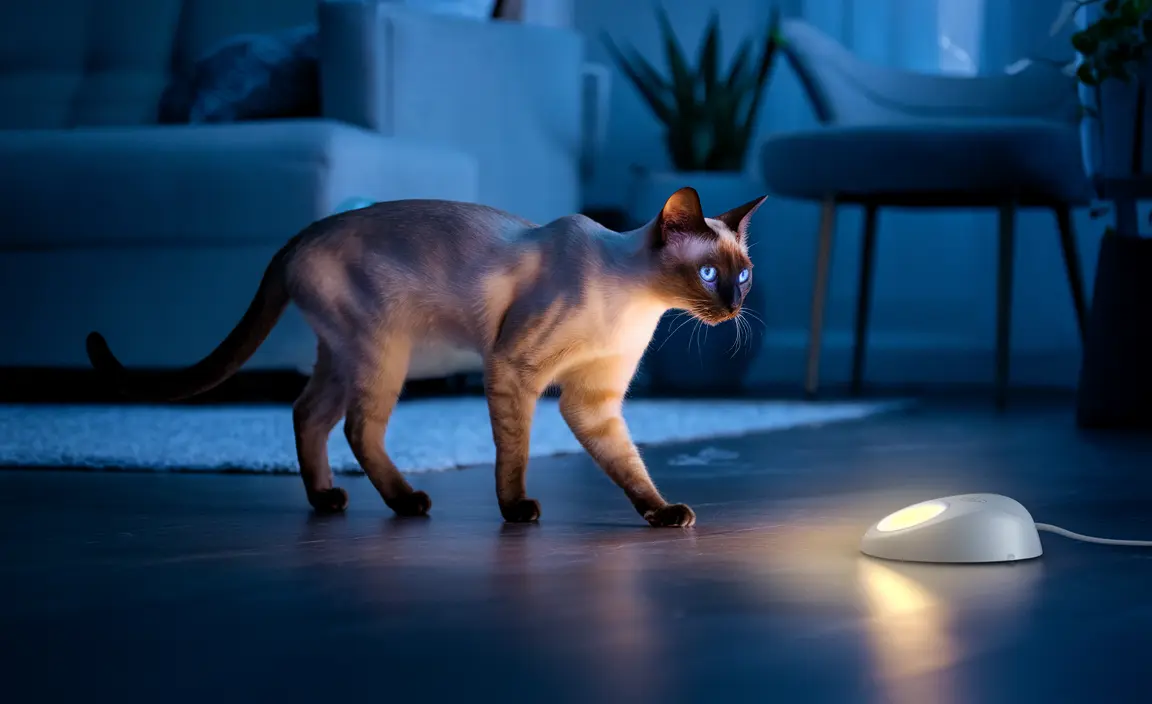As a cat owner, you might wonder about your feline friend's nighttime comfort and safety. The question of whether to leave a light on for your cat is more nuanced than you might expect. Understanding your cat's unique vision and nocturnal behaviors can help you make the best decision for their well-being.
Cats are naturally equipped with remarkable low-light vision that far surpasses human capabilities. Their eyes are specifically designed to navigate dark environments with ease, making artificial lighting often unnecessary and potentially disruptive to their natural rhythms.
Cat Vision: Nature's Perfect Night Vision System
Cats possess an extraordinary visual system that allows them to see remarkably well in low-light conditions. Their large, expansive pupils can dilate to capture even the smallest amount of available light, while a special reflective layer called the tapetum lucidum amplifies incoming light, creating a superior night vision mechanism.
How Cats See in the Dark
Unlike humans, cats have a higher concentration of rod cells in their retinas, which are responsible for detecting movement and seeing in dim light. This biological adaptation means that even in near-darkness, your cat can navigate your home with incredible precision, using a combination of keen eyesight, whiskers, and other sensory inputs.
Potential Risks of Leaving Lights On
Contrary to what many pet owners might assume, leaving lights on can actually create several problems for your feline companion. Artificial lighting can significantly disrupt a cat's natural circadian rhythm, potentially leading to sleep disturbances and behavioral changes.
Disrupting Natural Sleep Patterns
Cats are crepuscular animals, meaning they're naturally most active during dawn and dusk. Constant artificial lighting can confuse this inherent biological clock, potentially causing increased nighttime activity and reduced overall sleep quality.
When Nighttime Lighting Might Be Beneficial
While most adult cats don't require additional lighting, there are specific scenarios where a soft, gentle light source could be helpful. Kittens, elderly cats, or those with vision impairments might benefit from minimal, strategic nighttime illumination.
Special Circumstances for Nighttime Lighting
- Newly adopted cats adjusting to a new environment
- Senior cats with declining vision
- Cats with known navigational challenges
- Homes with complex layouts or potential hazards
Best Practices for Nighttime Cat Lighting
If you decide to provide some nighttime illumination, opt for gentle, non-invasive lighting solutions. A soft LED night light with low intensity or a motion-sensor light can offer minimal disruption while providing subtle guidance.
Lighting Tips for Cat Owners
- Use dim, warm-toned lights
- Choose motion-activated or timer-based night lights
- Avoid bright, harsh artificial lighting
- Consider natural light sources like moonlight or street lamps
Frequently Asked Questions
Why don't cats need lights on at night? Is their night vision strong enough for safe navigation?
Cats have evolved with exceptional low-light vision, featuring large pupils and a reflective eye layer that allows them to see effectively in minimal light. Their whiskers and other sensory abilities further enhance their nighttime navigation skills.
Should I leave a light on for my cat at night, or can it cause sleep disturbances?
In most cases, leaving lights on can disrupt your cat's natural sleep cycle. Cats are adapted to low-light environments and typically prefer darkness for optimal rest.
How does my cat's ability to see in low light impact its daily routine and behavior?
Cats' superior night vision allows them to remain active and alert during low-light conditions, which aligns with their natural hunting and exploring instincts.
Are there any situations where it's beneficial to leave a light on for my cat, such as for kittens or elderly cats?
Kittens, senior cats, or those with vision impairments might benefit from a soft, gentle night light to help them navigate and reduce anxiety.
What's the best way to provide nighttime lighting for my cat without disrupting their natural habits or my own sleep?
Use minimal, warm-toned lighting like a low-intensity LED night light, preferably with a timer or motion sensor to minimize disruption.
Understanding your cat's unique visual capabilities can help you create a comfortable, stress-free environment that respects their natural behaviors and promotes restful sleep.






